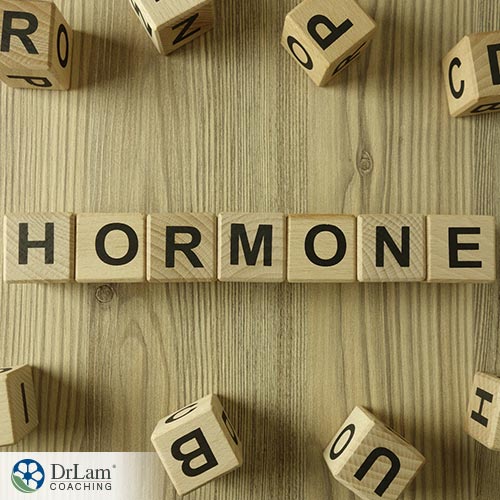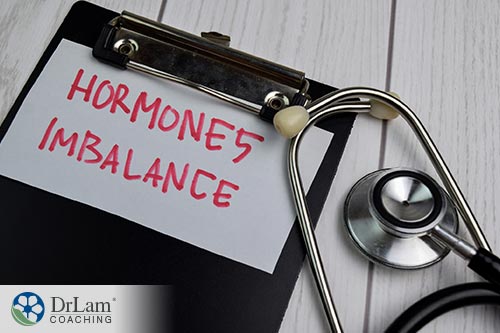Hormones are one of the main messengers your body uses to communicate. They travel to different organs and tissues in order to send messages about how and when to function. For example, they increase your appetite when your body needs nutrition or make you sleepy when it’s your natural bedtime. Hormone imbalance symptoms can vary widely because of how your hormones are involved in pretty much all your body’s functions.
In this article, we’ll discuss some of the most common symptoms of common hormone imbalances. We’ll also give you an overview of what can cause hormone imbalances in the first place and what you can do to address these causes. We promote a holistic and functional medicine approach that takes into account your physical, mental, and environmental state, so we’ll cover that approach briefly as well.
» Read our in-depth article on hormone imbalance symptoms and the OAT axis
» Adrenal Fatigue FAQs
» Take our 3-minute test to see if you may have Adrenal Fatigue
 Your hormones are involved in some very important functions, such as:
Your hormones are involved in some very important functions, such as:
They are also involved in growth and development, especially in children and adolescents.
Depending on which hormones are out of balance, you may see issues in one or several of these functions. Let’s take a look at each one separately then see how they may tie together.
How does your body know when it’s time to sleep and when it’s time to wake up? It has to do with how your body reacts to light. When there is sunlight, an area of your brain called the suprachiasmatic nucleus signals to your hypothalamus that it’s time for your body to wake up. Then, your hypothalamus tells your pituitary gland to get your adrenal glands to secrete cortisol, your body’s main stress hormone. This hormone also gets your body alert and ready for action.
Your hypothalamus and pituitary gland are also inside your brain, while your adrenals are endocrine glands are located on top of your kidneys. The three together form what’s called your hypothalamic-pituitary-adrenal (HPA) axis, which is very much involved in your stress response as a whole, not just this cycle.
Cortisol should be at its highest in the morning so you can start your day. It makes you more alert and active. Then, as the day ends and the evening starts, its levels should be decreasing more and more until they reach very low levels during the night. As evening begins, your main sleep hormone, melatonin, should be starting to increase, until it reaches its peak between 2 to 4 a.m.
Melatonin is produced by different tissues in your body, though mainly by the pineal gland, also located within your brain. Cortisol and melatonin counter each other in your biological clock so that your sleep/wake cycle runs smoothly.
However, if one or both of these hormones is out of sync, you can get sleep-related hormone imbalance symptoms such as:
Metabolism is how your body produces and uses energy. It’s the basis of your ability to live - the processes that fuel your body. Your basal metabolic rate is the amount of energy required just to keep you alive, warm, and functioning. While any activities beyond those require extra energy. You get your energy from food. Then, a bunch of hormones are involved in turning that food into fuel and using that fuel correctly.
Some of the most important hormones involved in how your body uses energy are your thyroid hormones. For example, they are the ones that help maintain your basal metabolic rate to keep your body temperature at a certain level at all times and keep your important functions going.
Thyroid hormone imbalance symptoms depend on whether you have an underactive or overactive thyroid.
With an underactive thyroid, often called hypothyroidism, your metabolism will slow down, and you'll see symptoms such as:
On the other hand, if you have hyperthyroidism, or an overactive thyroid, symptoms can include:

Although most doctors recommend hormone replacement therapy for hypothyroidism as a first line of care, we sometimes prefer to check if there is dysregulation in the stress response first. Many of our clients with thyroid hormone issues actually have adrenal fatigue, which then caused thyroid imbalance. So in these cases, when the adrenal fatigue is resolved, the thyroid returns to normal and no hormone replacement is needed. Adrenal fatigue and its recovery are discussed more below.
When your hormones are in balance, you get the signal to eat when your body needs nutrients and energy. That’s the hunger signal. Then you get the signal to stop eating when you’ve consumed enough food to meet those requirements. That’s the satiety signal. But many people don’t have correct hunger and satiety signals.
A lot of the processed and convenient food available these days is empty calories. It doesn’t contain the nutrients your body needs. So you end up feeling hungry more often because your body is trying to signal that it needs nutrients. If you eat more empty calories, you don’t get the nutrients you need, and the hunger signal gets louder and louder. This is one reason there is a problem with overeating, although obesity as a condition has many other contributing factors.
Ghrelin is your hunger hormone; it’s the one that tells you to eat. Leptin is your satiety hormone; it’s the one that tells you to stop eating. Insulin is the hormone that tells your cells to allow glucose in, and if there’s too much of it, you can get low blood sugar. This will prompt your body to signal for you to eat more. Low blood sugar is another huge stressor, and as such, will trigger your stress response.
Hormone imbalance symptoms here depend on which hormones are affected and how.
For example, high ghrelin levels will make you overeat, while low levels will lower your appetite. Leptin will have the opposite effects. High insulin levels can lead to hypoglycemia, which can make you feel anxious, shaky, sweaty, hot, and hungry. Low insulin levels can lead to high blood sugar and can be a sign of diabetes.
Sex hormones are involved in your reproductive cycle but also in other functions. In women, estrogen and progesterone work against each other to maintain a specific hormone balance. This balance not only regulates a woman’s reproductive cycle, such as menstruation, ovulation, fertility, pregnancy, and menopause. It also affects a woman’s energy levels, mood, mental clarity, weight, and the health of her reproductive organs.
One of the most common and disruptive hormone imbalances women face is estrogen dominance. This is often the relative dominance of estrogen over progesterone, rather than an absolute increase in estrogen. What happens with aging, as well as from external factors, is that estrogen and progesterone decrease, but not at the same rate. Progesterone decreases faster, so estrogen then becomes more dominant in the system.
Hormone imbalance symptoms of estrogen dominance include:
Men can also experience estrogen dominance, where estrogen becomes more dominant than testosterone in the system.
Hormone imbalance symptoms in men include breast enlargement, sexual dysfunction, and infertility.
 The stress response is how your body reacts to both physical and emotional stressors. This reaction is coordinated by the NeuroEndoMetabolic (NEM) Stress Response, which is composed of six circuits of organs and systems that work together to fight stress. They are the Hormone, Bioenergetics, Cardionomic, Neuroaffect, Inflammation, and Detoxification circuits.
The stress response is how your body reacts to both physical and emotional stressors. This reaction is coordinated by the NeuroEndoMetabolic (NEM) Stress Response, which is composed of six circuits of organs and systems that work together to fight stress. They are the Hormone, Bioenergetics, Cardionomic, Neuroaffect, Inflammation, and Detoxification circuits.
Your adrenal glands secrete cortisol, thanks to the HPA axis hormone cascade. The adrenals are part of the Hormone Circuit, along with the thyroid and sex glands. Together, they form other axes, such as the ovarian adrenal thyroid (OAT) axis.
This means that if one of these components dysregulates, the others are also at risk. We see this happen with almost all hormone issues. That’s why hormone imbalance symptoms can seem so confusing and disconnected. Yet they are absolutely linked.
Physical stressors include things like an unhealthy diet, an unmanaged chronic condition, overconsumption of alcohol, taking certain medications, getting recurring infections, leading a sedentary lifestyle, smoking, and being exposed to toxins, to name just a few. Emotional stressors can include work problems, financial pressure, losing a loved one, and relationship difficulties.
Your body is made to handle acute stress. But if one or more of the stressors listed above is continuous, you are now facing chronic stress. Your adrenals have to work extra hard to produce more cortisol to meet the growing demand. But they eventually get exhausted and can’t keep up.
This is what leads to Adrenal Fatigue Syndrome (AFS). Cortisol hormone imbalance symptoms, or symptoms of AFS, include fatigue, weight gain, sleep issues, brain fog, anxiety, mild depression, dry skin, hair loss, loss of libido, PMS, infertility, lowered immunity, hypoglycemia, salt and sugar cravings, food and drug sensitivities, estrogen dominance, heart palpitations, and blood pressure instability.
Many of these symptoms are shared with the other hormone imbalances. This is because hormones affect each other. One imbalance leads to another, which leads to another, creating a kind of domino effect. But the good news is that, if you improve one imbalance, others often improve as well.
We usually like to focus on the root imbalance with our clients, as it gives the biggest boost. Once that core issue is resolved, the other hormone systems often naturally rebalance without much intervention needed. And many times, we find chronic stress and NEM dysregulation at the heart of these issues. We recommend you find a practitioner who will guide you to do the same.
 Hormone imbalance symptoms can vary widely because they depend on which hormone system is affected the most. And you can find yourself with symptoms from different imbalances because different imbalances can cause each other. And these imbalances progress with time. You can start out with a few mild symptoms, then later find yourself bedridden from fatigue and weakness.
Hormone imbalance symptoms can vary widely because they depend on which hormone system is affected the most. And you can find yourself with symptoms from different imbalances because different imbalances can cause each other. And these imbalances progress with time. You can start out with a few mild symptoms, then later find yourself bedridden from fatigue and weakness.
Many issues can cause hormone imbalances, including diet, lifestyle, environment, and psychological stress. Stressors, whether physical or emotional, are a very common root cause of such problems. And unless you address the stress at the root, no real symptom resolution is possible. You have to take into account your entire system in order to create the best recovery protocol possible.
We don’t recommend you attempt recovery on your own. Articles like this one are generalized, and you need an individualized approach. You may or may not be able to get that with your regular physician, depending on their style. So if you are unsure of how they work, it’s a good idea to ask them about this and ask whether they have experience with NEM dysregulation or AFS. Many mainstream healthcare professionals are not aware of these conditions, which could set you up for a longer recovery or even a misdiagnosis.
If you’d like to get more information about what would be the right approach for you, you can call us for a free initial consultation with one of our expert coaches. You can talk to our team at +1 (626) 571-1234 or click here for our Ask the Doctor system. We can look at whether one of our programs might be suitable for you and how we can tailor it to your specific needs.
Hormone imbalance symptoms can be quite confusing. They can include a range of symptoms, such as fatigue, weight gain, anxiety, and insomnia. That’s because hormones are involved in almost every function in the body and are linked to each other. Here’s how to get to the root of your specific imbalance.
"I am reading your article on the OAT axis imbalance..."
"I am reading your article on the OAT axis imbalance and must respond! I am sitting here feeling elated, validated, SEEN and finally beginning to understand and unravel the crazy and frustrating mysteries of my years of suffering!
Reading your article(s), I am beginning to understand and piece it all together to my growing relief and gratitude! This sentence of yours speaks volumes to me: What the body wants (to slow down) and what the medications are designed to do (to speed up) are diametrically opposed to each other.
THANK YOU! THANK YOU!"